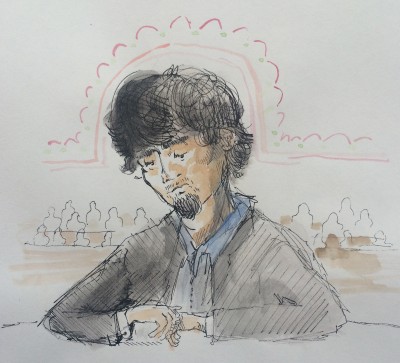
Attorneys for Dzhokhar Tsarnaev rested their case Monday on the eighth day of defense testimony in the penalty phase of Tsarnaev’s trial, prompting rebuttal from the prosecution and signaling the beginning of closing statements later in the week.
Tsarnaev, 21, a former University of Massachusetts Dartmouth student, was found guilty of placing two bombs at the 2013 Boston Marathon that killed three and injured more than 260. Seventeen of his 30 charges carry the death penalty.
The defense highlighted why they believe Tsarnaev should not receive the death penalty and tried to illustrate how a life sentence would be enough of a punishment for his crimes.
Sister Helen Prejean, a Roman Catholic nun and member of the Congregation of St. Joseph, took the stand as the first witness. Prejean is one of the country’s leading opponents of the death penalty.
Prejean established a nonprofit “prison ministry” called the Ministry Against the Death Penalty for nuns to meet with prisoners, especially those on death row. At his defense’s request, she has met with Tsarnaev five times before his trial began.
“I agreed to meet with him for the same reason as we do with other people who have done terrible crimes: to accompany him,” she said. “It’s not just somebody to direct them, or convert them. It’s to help them come to grips and take responsibility.”
Her meetings with Tsarnaev were generally positive, Prejean said. There were disagreements, but she described him as “very open and receptive.” She read up on the Quran to better understand the similarities between Catholicism and Islam and find that “spiritual core,” she said.
Prejean said after establishing a rapport with Tsarnaev, she asked him about how he felt about what he did.
“When I asked him, he said it emphatically, he said, ‘No one deserves to suffer like they did,’” she said. “His face registered it, and he kind of lowered his eyes and his voice had pain in it actually, and I had every reason to think he was taking it in and that he was genuinely sorry for what he did.”
Tsarnaev didn’t deliver a formal apology, but Prejean said she believes his sentiments were sincere.
Upon cross examination, the prosecution suggested there are divisions of Prejean’s ministry closer to Boston and that her participation in the case makes a political statement, which she denied.
The defense then rested its case, which led to rebuttal from the prosecution. The remainder of the day focused on the processes of the prison system.
Their first witness, Michelle Nicolet, is a supervisory special agent with the Federal Bureau of Investigation who works in counterterrorism investigations. Nicolet has worked with the U.S. Bureau of Prisons’ special administrative measures program, also known as “SAMs.”
The BOP places certain inmates under SAMs when it is determined that there could be potential security risks from the inmate’s communication with others, Nicolet said. Inmates are placed under SAMs for a finite term, but they can be renewed if certain conditions are met.
Nicolet confirmed Tsarnaev is currently under SAMs and has had his term extended, which she said is typical for high-profile crimes with heavy media attention.
The prosecution also called John Oliver, a complex warden at the United States Penitentiary Administrative Maximum Facility, also known as ADX “supermax,” in Florence, Colorado, where Tsarnaev would serve his life sentence.
Oliver said the FBI and the BOP are involved with the processes of the SAMs program to ensure the safety of the inmates. There are different levels of access to privileges between SAMs and non-SAMs prisoners, he said.
“The Bureau [of Prisons] is working at all times to reduce restrictions on the inmates,” he said. “An inmate at ADX is permitted five social visits a month, regardless of the SAMs. The inmate can have unlimited legal visits [and] two social phone calls a month, each 15 minutes in duration.”
There is no limit on the letters an inmate can send or receive, and there are comprehensive security protocols to ensure safety, Oliver said. The BOP and the FBI inspects and approves all personal mail.
“We have linguists that review the letters that are going out, but it can delay both incoming and outgoing mail,” he said. “When a letter comes in, it is opened, photocopied, scanned and sent to the FBI.”
Because legal mail is not examined, though, a prisoner could send out questionable material labeled as legal mail and the potential harm could go unnoticed, the prosecution pointed out. Oliver confirmed that it is a possibility.
Court will adjourn until Wednesday when both sides will deliver closing statements. U.S. District Court Judge George O’Toole will meet with the jury to give instructions on how to form a verdict.






















































































































